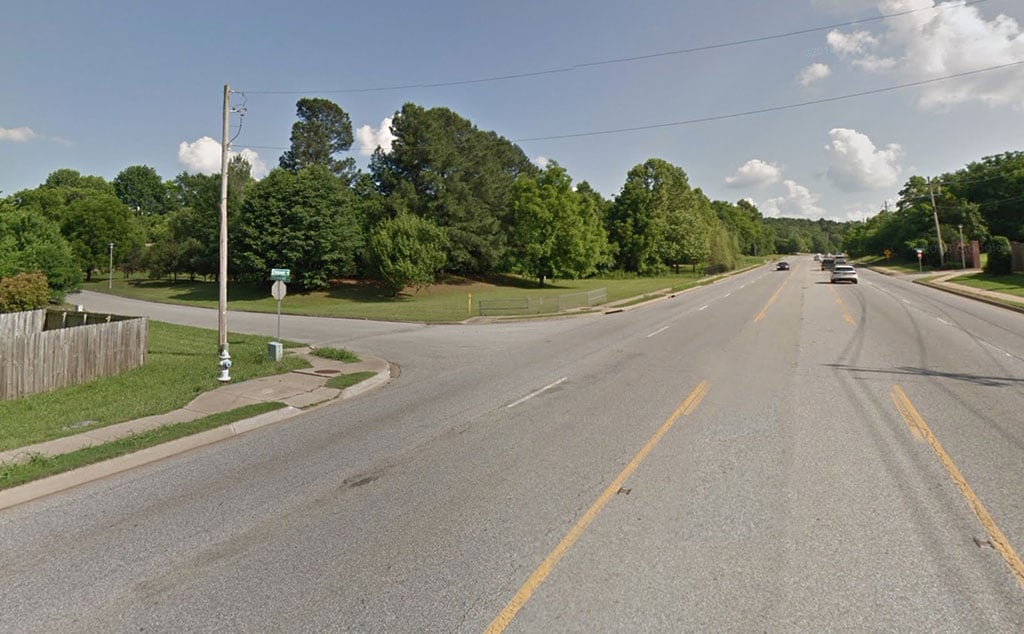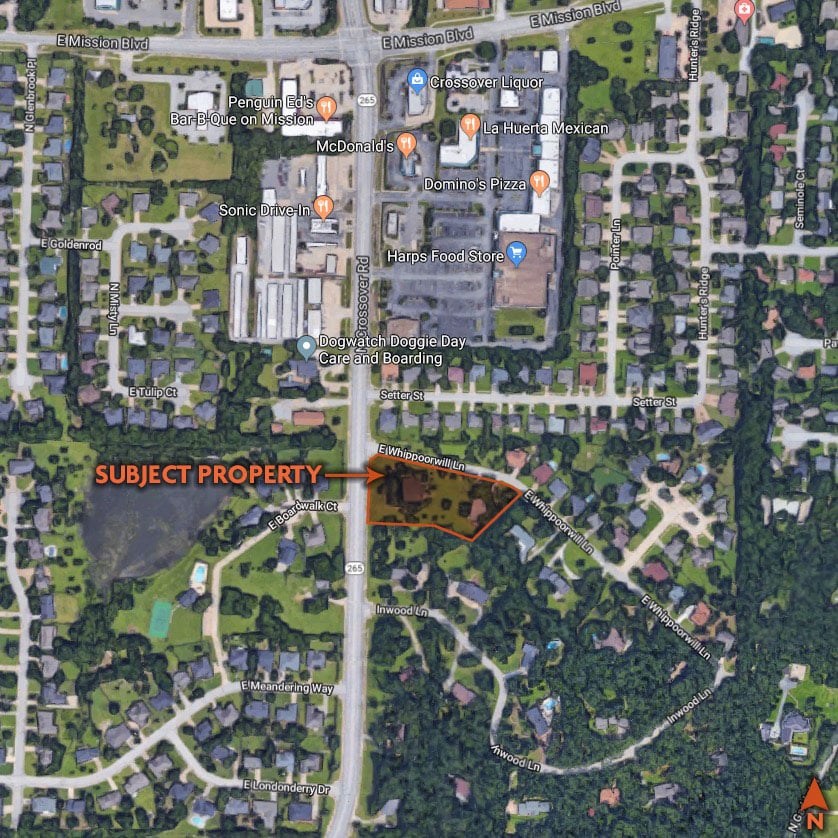
Whippoorwill Lane and Crossover Road / Google Maps
Two east Fayetteville residents have asked the court to decide whether a group of planned new homes could be built in their neighborhood.
A lawsuit was filed Thursday on behalf of plaintiffs Laura Cate and Christopher McGinnis against the Roth Family Partnership and their Elite Equity Group of Arkansas company. The complaint for declaratory judgement was filed by Cate’s husband, Brandon, through the Washington County Circuit Court. Brandon Cate is an attorney with Quattlebaum, Grooms & Tull PLLC of Springdale.
McGinnis and The Cates live in the Glendale Addition subdivision on the east side of Crossover Road near Mission Boulevard. The neighborhood is made up of a loop that includes Whippoorwill Lane and Inwood Lane. The 20-lot addition includes homes on large lots that were built mostly in the late 1960s and early 1970s.
The complaint concerns plans by the Roth family to build a set of homes across two lots that sit at the entrance to the neighborhood on Whippoorwill Lane directly adjacent to Crossover Road. One lot is undeveloped, and the other includes one single-family home.
Each lot in the neighborhood is currently in a residential district that allows up to four units per acre, but the Roth family asked the City Council on Tuesday to rezone their property to allow up to eight units per acre. Their two lots take up about 2 acres, so the maximum amount of units that could theoretically be built on the land is 16 homes. It’s unclear whether that many homes would actually fit within the lot boundaries. The exact amount would depend on the size of the homes, how they are situated on the property, and whether an existing pond on one of the lots stays in place. The Roth family has not finalized the details of their plan, but has said they expect the homes to be priced at around $250,000 (they later stated the plan is to price them in the $300,000-$325,000 range).
Over a dozen residents spoke against the proposed rezoning at Tuesday’s council meeting. Many cited fears about safety and concern over additional stormwater runoff that might occur if the new homes are constructed. Others said they didn’t want cheaper homes in the area, and a few said if approved, the rezoning could open the door for similar requests for added density along Crossover Road.
The Cates, along with McGinnis, were part of the opposition Tuesday, and argued that a cluster of homes at the corner of Crossover and Whippoorwill would change the character of the neighborhood.
“I understand the need for development, but 16 houses at the end of the street? It doesn’t fit,” said Laura Cate.
Her remarks were in response to comments made earlier by Council member Kyle Smith, who said that while he hadn’t yet made up his mind about this particular rezoning request, he was generally on board for gradual increases in density.
Smith said one of the council’s duties is to help manage the growth of the city, and finding compatible places to facilitate more homes is part of that solution. He said when proposals for incremental increases in density across towns are ignored, the result is often monumental increases in other areas. Those areas, he said, tend to be lower income neighborhoods with residents who don’t have the means or political capital to fight it.
Council member Sarah Marsh said the requested zoning for 8 units per acre is appropriate for the area. She said it’s on a major arterial roadway and is a good transition from the current 4 units per acre and the 24 units per acre that’s allowed immediately adjacent to the north on Setter Street.
McGinnis said he also understands that the city is growing, but told the council he believes adding more homes to established neighborhoods is the wrong way to go about solving the growth problem.
Brandon Cate agreed.
“We know Fayetteville has growth issues, but residential landfill and growth should be done responsibly,” he said. “And should not be done at the cost of the environment or with a significant loss of old trees and a pond. City planners need to take into account traffic, safety, and neighborhood history and integrity in considering rezoning issues.”
The council left the proposal on the first reading, but the lawsuit filed Thursday seeks to overrule the entire process.
In the filing, Cate and McGinnis argue that the Roth’s plan can’t move forward because the rules of their neighborhood simply won’t allow it.
As evidence, the plaintiffs included a copy of the protective covenants of the Glendale Addition, which state that “only one residence shall be erected on any one lot.” The documents, which was written in 1968, was to be binding for 25 years. The covenants state that after that time period, the rules could be terminated if a majority of the lot owners agreed to do so in writing. The lawsuit alleges that at no time have a majority of the property owners expressed their intention in writing that they no longer desire for the rules to be in effect.
Council member Sarah Bunch, who is a local real estate agent, said it can be hard to apply 50-year-old neighborhood protections.
“It can be a challenge to try and enforce (covenants) if they have not been kept up over time,” said Bunch, especially if the neighborhood doesn’t have an active property owners’ association or if the covenants have not been enforced through the years.
Brandon Cate said Friday the neighborhood does not have a property owners’ association, but the question is really one of reliance. The plaintiffs, he said, obtained a copy of the protective covenants and relied on the protections set forth them when deciding to purchase their homes.
The council is currently set to continue the rezoning discussion at their next regular meeting on March 19.


